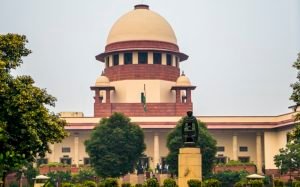This judgment addresses a criminal appeal against a conviction for murder and disappearance of evidence, highlighting crucial legal principles regarding circumstantial evidence and extra-judicial confessions.
Shanti Devi (accused No.1), Rajbir (accused No.2), and Veena (accused No.3). All three were accused of offences punishable under Section 302 (murder) and Section 201 (causing disappearance of evidence) of the Indian Penal Code, read with Section 34 (common intention).
All three accused were found guilty by Trial Court and sentenced to life imprisonment for murder and three years for causing disappearance of evidence.
The appeals filed by Shanti Devi and Rajbir were rejected by High Court. Veena’s appeal abated due to her death.
Law Involved
Indian Penal Code, 1860:
Section 302: Murder.
Section 34: Acts done by several persons in furtherance of common intention.
Section 201: Causing disappearance of evidence of offence, or giving false information to screen offender.
Indian Evidence Act, 1872:
Sections 25 & 26: Pertaining to the inadmissibility of confessional statements made to police officers.
Section 27: Allows for the discovery of facts based on information given by an accused while in custody.
Principles of Circumstantial Evidence: The prosecution’s case was based solely on circumstantial evidence. The judgment reiterated “golden principles” for conviction in such cases, including that the circumstances must be fully established, be conclusive, consistent only with guilt, exclude all other hypotheses, and form a complete chain leaving no reasonable doubt of innocence.
Admissibility of Extra-Judicial Confessions: These are considered weak evidence and must be examined with great care and caution. They must be voluntary, truthful, inspire confidence, be corroborated by other evidence, and be free from discrepancies. The court referred to Sahadevan v. State of Tamil Nadu regarding the evidentiary value of extra-judicial confessions.
Reasoning:
The Supreme Court meticulously analyzed the evidence, finding several critical flaws in the prosecution’s case:
Motive Not Established: The alleged motive of an illicit relationship between Balwant and Veena, and the dispute over the house, was found to be unsubstantiated by evidence and contradictory. The informant’s (PW-11) version regarding Balwant’s “illegal occupation” was dismissed as mere suspicion.
Unreliable Extra-Judicial Confessions:The confessions made by the accused to the police were found inadmissible under the Indian Evidence Act.
The discovery statements (leading to recoveries of weapons like Kulhari and Bugda) were deemed unreliable, as a key witness (PW-12) admitted his testimony was based on what the investigating officer (PW-18) told him. Another witness (PW-14) for recoveries was not noted in the memo, and the court concluded these recoveries were “fake and planted”.
Witnesses (PW-15, Krishan @ Kuli, and PW-17, Shamsher Singh) who testified about extra-judicial confessions were found to lack credible knowledge of the accused or the incident details. Their testimony was characterized as a “cock and bull story created by the police,” and PW-15 admitted he was compelled to produce confessions.
A significant delay (15 to 16 days) in recording the statement of PW-15 further weakened the prosecution’s case.
Lack of Forensic Corroboration: The Forensic Science Laboratory (FSL) report did not find blood on the alleged weapons (Kulhari and Bugda). While human blood was found on a bedsheet and blanket, its grouping was not provided, failing to connect it to the victim or accused. The FSL report did not support the incriminating recoveries, further negating the prosecution’s claims.
Failure of Circumstantial Evidence: The court concluded that the prosecution failed to prove a single incriminating circumstance, and the entire case suffered from “serious contradictions”. The chain of circumstantial evidence was not complete, failing to meet the “golden principles” required for conviction.
Holding
The Supreme Court found that the trial Court and the High Court had erred in appreciating the evidence and relying on the unreliable extra-judicial confession theory and uncorroborated evidence. The impugned judgment of the High Court dated May 24, 2024, and the trial Court judgment dated January 14, 2003, were set aside and quashed.
The appellant-accused, Shanti Devi, was acquitted of all charges. The benefit of this judgment was also extended to the non-appealing accused Rajbir (accused No.2), who had not filed an appeal against his conviction, as the prosecution’s entire case was discarded.
SHANTI DEVI V. THE STATE OF HARYANA
Supreme Court: 2025 INSC 987 (DoJ 06-08-2025 )






